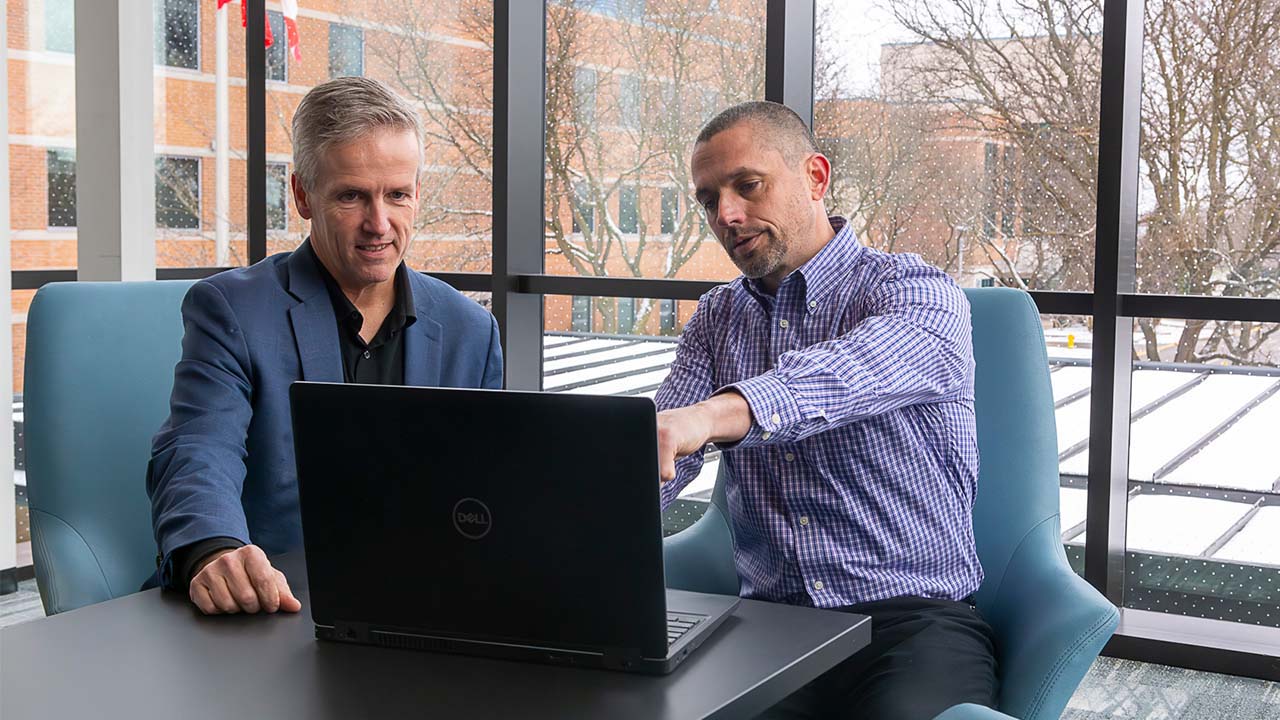Rapid Design Studio elevating virtual learning at Fanshawe
 CREDIT: JOHN SING
CREDIT: JOHN SINGThe Rapid Design Studio, created in part by Kevin Deveau (left) and Matt Farrell (right), will focus on building dynamic online learning experiences.
On Feb. 12, online and Blended Learning will launch a new resource to help faculty enhance their online, blended and web-enhanced courses and improve student outcomes: Rapid Design Studio (RDS).
Kevin Deveau, Director of Blended and Online Learning at Fanshawe College, shed light on the genesis of the RDS, tracing its roots back to 2013 when a reference was made to the “need for a service like Rapid Studio Design to help professors.”
With a focus on designing dynamic online learning experiences, the RDS specializes in crafting interactive learning tools, such as HTML5 Package content (H5P) and ensures that all materials meet the standards outlined in the Accessibility for Ontarians with Disabilities Act (AODA).
“It was more of an idea that, if you put it around 2020, just before the pandemic, became one of the commitments of the president of Fanshawe, Peter Devlin.”
The RDS team will work closely with faculty members to develop interactive resources that enhance student engagement and exploration of critical concepts through virtual consultations.
“RDS is there to capture the ideas of the faculty and develop a learning object based on those ideas. So over time, we’ll see several learning objects that we can share with other college programs,” Deveau explained.
Flight Services program coordinator Haley Whitelaw participated in an RDS pilot project and explained this service by drawing parallels to popular educational games such as Teach Your Monster and language learning apps such as Duolingo.
“It’s like turning a learning experience into a little game,” Whitelaw said. “Those H5P content are great tools because they help the students learn something differently than just reading or being told about it in a lesson.”
eLearning Curriculum Consultant Matt Farrell helped Whitelaw create interactive content for her students. According to Farrell, adding more interactive elements, such as drag and drop, fill-in-the-blank, flip cards can be helpful to asynchronous course time. It allows students to test their knowledge in real time and keeps them engaged.
“We want to help them make their online courses a little more feature- rich, maybe adding some more elements of interactivity or giving them some advice on making more engaging content,” Farrell explained.
Reflecting on the pilot phase of the RDS, Farrell expressed satisfaction with the feedback from faculty members.
“So far, it’s been pretty good,” he said. “I’ve worked with about seven faculty members, which is a pretty good amount for a pilot project. And everybody has been pleased. Everybody’s been pleased.”
As Fanshawe College forges ahead with its approach to online learning, the introduction of the Rapid Design Studio marks a significant step towards fostering interactive and engaging educational experiences for students and faculty alike.















